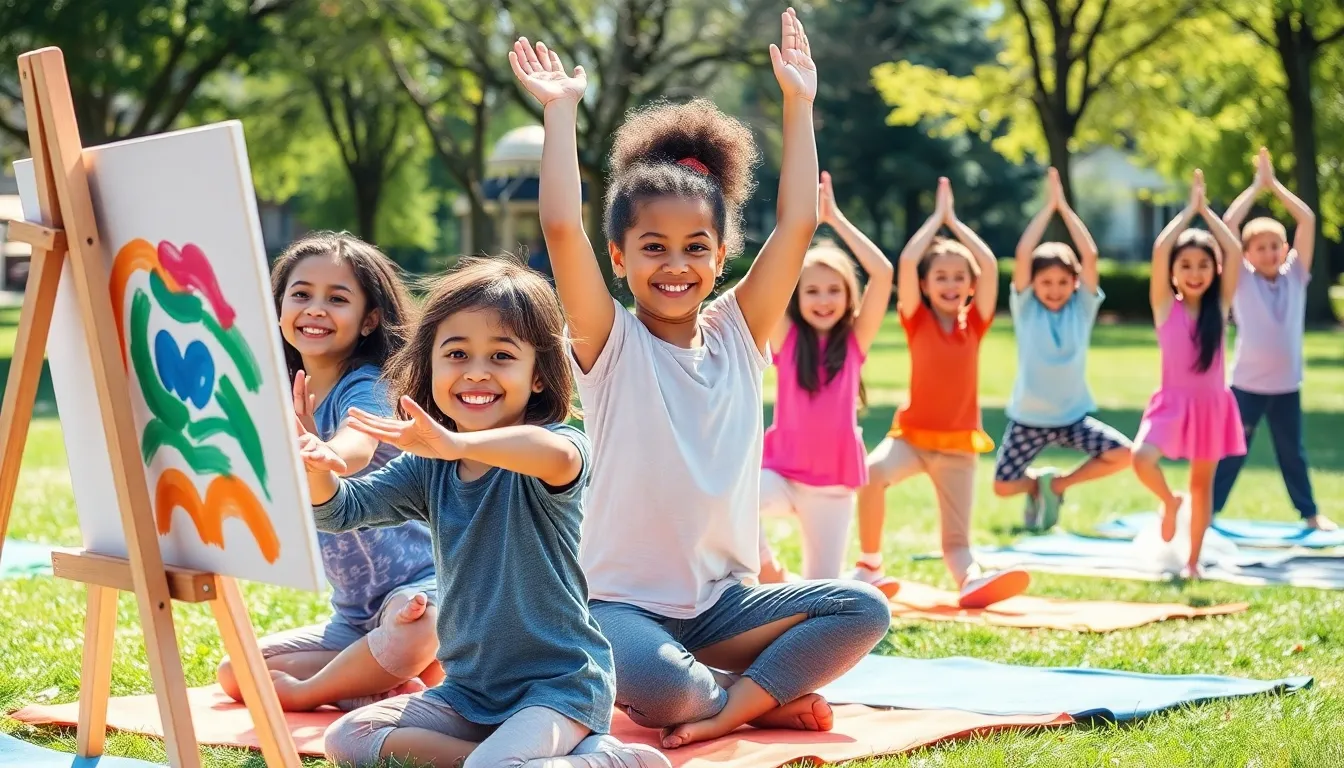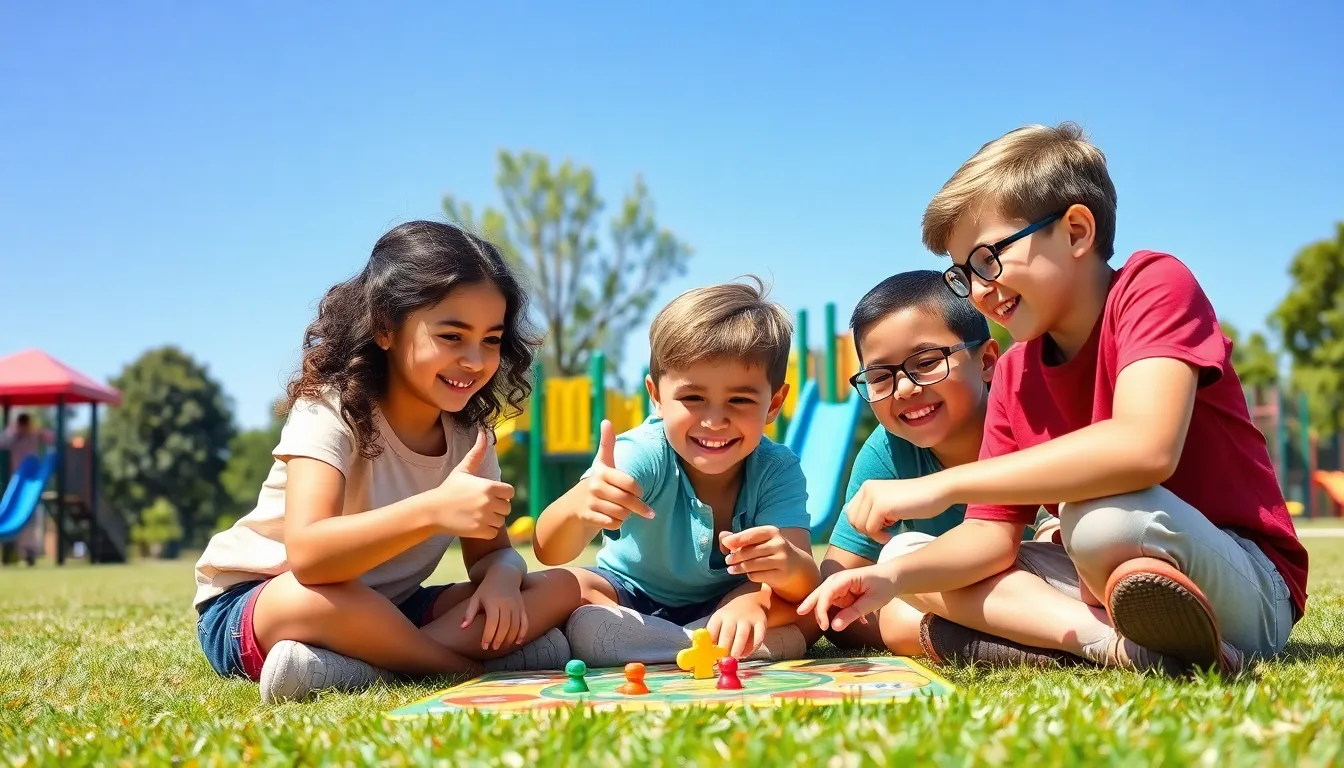In a world where kids juggle school, sports, and social media like circus performers, mental health often gets tossed aside like yesterday’s lunch. But fear not! Engaging in fun mental health activities can be the secret sauce to help them thrive. Imagine a toolbox filled with creativity, laughter, and mindfulness, all tailored to boost their emotional well-being.
Table of Contents
ToggleImportance Of Mental Health For Kids
Mental health is crucial for children as it influences their overall development. Positive mental health contributes to emotional stability, aiding kids in coping with life’s challenges. Strong mental well-being fosters resilience and helps children face academic pressures. Engaging in mental health activities promotes emotional regulation and supports social interactions.
A lack of attention to mental health can lead to anxiety and depression, significantly impacting a child’s ability to learn. These issues can hinder friendships and impede participation in sports or other interests. Children equipped with effective mental health tools handle stress better and develop healthy coping strategies.
It’s essential for caregivers and educators to prioritize mental health. Awareness of emotional struggles allows adults to provide necessary support. Including mental health discussions in daily routines decreases stigma and normalizes emotions. Research shows that children who participate in mental health activities demonstrate improved focus and increased happiness.
Promoting mental health activities builds a foundation for lifelong well-being. Simple practices like journaling, art therapy, and mindfulness exercises can make a difference. Encouraging children to express feelings through creative outlets nurtures self-awareness and confidence. Programs emphasizing these activities see greater emotional development among participants.
Fostering a supportive environment allows kids to thrive in all aspects of life. Focused attention on mental health benefits academic performance, relationships, and overall happiness. Prioritizing mental health in childhood sets a positive trajectory for adulthood.
Top Mental Health Activities For Kids

Incorporating mental health activities into children’s routines supports their emotional well-being. Engaging in a variety of activities helps children develop resilience and coping skills.
Creative Arts And Crafts
Creative arts and crafts promote self-expression and boost confidence in children. Drawing, painting, or crafting allows kids to communicate feelings without words. Group projects foster teamwork and collaboration. Utilizing varied materials, such as clay, paints, or recycled items, encourages creativity. Examples of activities include painting with fingers, making friendship bracelets, or creating vision boards. These engaging experiences provide a healthy outlet for emotions, reinforcing positive mental health.
Mindfulness Techniques
Mindfulness techniques enhance self-awareness and emotional regulation in children. Breathing exercises, such as deep belly breaths, help reduce stress and anxiety. Guided imagery encourages kids to visualize calming scenes, promoting relaxation. Practicing short meditations for five to ten minutes aids in focusing attention and clearing the mind. Simple activities like mindful walking and listening to sounds can also enhance present-moment awareness. Incorporating these techniques into daily routines cultivates a sense of peace and balance.
Physical Activities
Physical activities contribute significantly to children’s mental health. Engaging in sports or outdoor play boosts endorphins, improving mood and reducing stress. Activities like jogging, dancing, or playing tag promote social interaction and teamwork. Structured games and exercises enhance physical fitness while building self-esteem. Options such as yoga or martial arts provide discipline and focus. Encouraging regular physical activity helps kids develop a stronger connection between body and mind.
Social Activities That Promote Mental Health
Social activities significantly enhance children’s mental health, fostering connections and emotional well-being. Engaging in these activities helps kids develop essential social skills and build relationships.
Group Games And Team Sports
Group games and team sports promote cooperation and communication among children. Participating in these activities cultivates team spirit, encouraging kids to work together toward common goals. Sports like soccer or basketball also provide physical exercise, which has proven benefits for mood enhancement and stress reduction. Such activities create opportunities for kids to make friends and share experiences. Moreover, friendly competition can teach resilience, helping them navigate both wins and losses in life.
Role-Playing And Drama Activities
Role-playing and drama activities allow children to express themselves creatively and build empathy. Through imaginative play, kids gain insights into different perspectives, fostering understanding and compassion. Activities like acting in a play or engaging in improv games encourage social interaction and collaboration. These interactions help develop verbal skills and boost confidence, enabling children to articulate their feelings more effectively. Furthermore, drama activities can serve as a safe space for kids to explore emotions, ultimately enhancing their mental health.
Incorporating Mental Health Activities At Home
Parents can play a significant role in promoting mental health through various activities. Engaging children in creative arts and crafts, such as drawing and painting, stimulates self-expression. This form of expression enhances confidence, allowing them to communicate feelings visually.
In addition, incorporating mindfulness techniques into daily routines fosters emotional regulation. Practicing deep breathing exercises or guided imagery can help children manage anxiety effectively. Setting aside time for these practices encourages a calming environment.
Physical activity acts as another vital component of mental health. Participating in outdoor play or sports not only improves physical fitness but also boosts mood and reduces stress. Social interactions during these activities enhance self-esteem and foster connections.
Establishing a family journaling time promotes reflective thinking. Writing about daily experiences or feelings can help children articulate emotions more clearly. This practice nurtures self-awareness and critical thinking skills.
Additionally, group projects or collaborative learning activities encourage teamwork. Children develop communication skills while working together, reinforcing the importance of cooperation. Engaging in role-playing games or drama activities builds empathy and enhances verbal expression.
Integrating these mental health activities at home creates a supportive atmosphere. Prioritizing mental well-being establishes a strong foundation for resilience and coping skills. Families, by providing these opportunities, ensure children thrive emotionally and socially, paving the way for a healthier future.
Prioritizing mental health activities for kids is essential for their emotional and social development. By engaging in creative arts mindfulness practices and physical activities children can build resilience and improve their overall well-being. These activities not only enhance self-awareness but also foster connections with peers and family.
Caregivers and educators play a pivotal role in integrating these practices into daily routines. Creating a supportive environment where children feel comfortable discussing their emotions can lead to healthier coping mechanisms. As they navigate the challenges of growing up it’s crucial to equip them with tools that promote mental wellness. Investing in children’s mental health today lays the foundation for a brighter and more resilient future.




